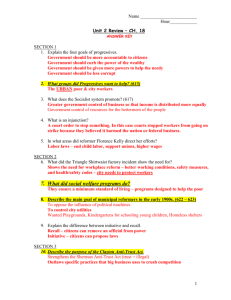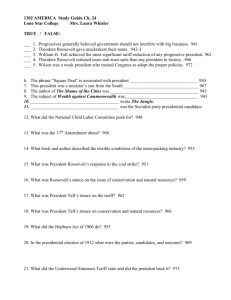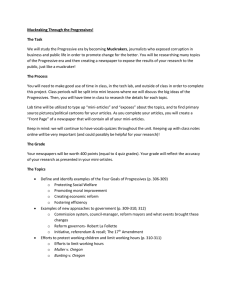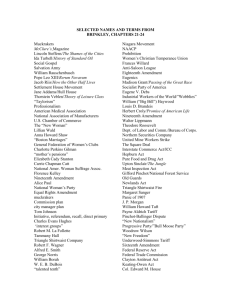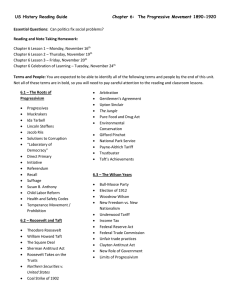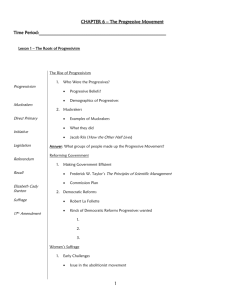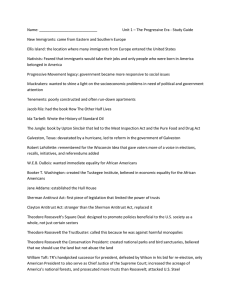Reform Movements - Henry County Schools
advertisement
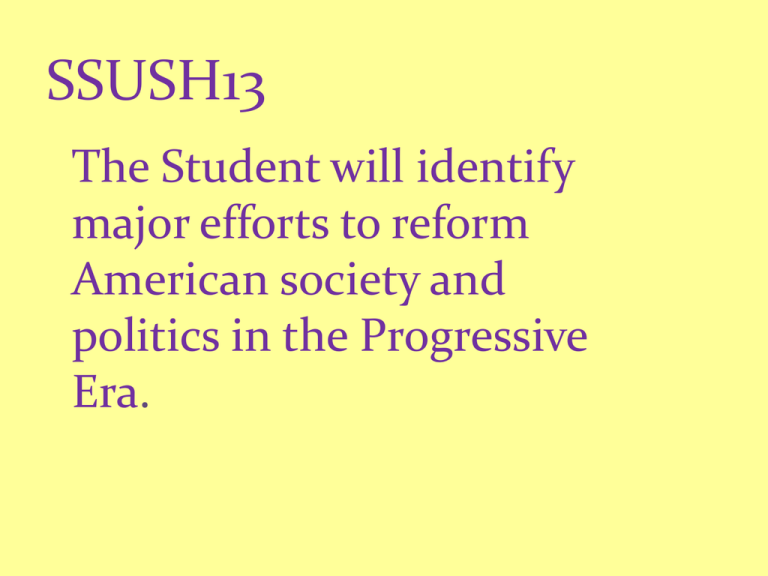
SSUSH13 The Student will identify major efforts to reform American society and politics in the Progressive Era. Reform Movements in the Progressive Era Preview and Processing 1. Who is the man in the picture? 2. What position did he hold? 3. Where was this picture taken? Progressive Era 1890-1920 • The progressive movement were reform efforts that were meant to give people opportunities and correct injustices. • Goals: • • • • Protecting social welfare Promoting moral improvement Creating economic improvements Fostering efficiency Progressive Presidents Theodore Roosevelt William Howard Taft Woodrow Wilson Theodore Roosevelt • • • • 1858-New York City Sickly child Books caused love for outdoors 1895-NYC Police Commissioner • Merit system • War of 1898/Spanish American War • Rough Riders-San Juan Hill • 1899- Governor of New York • 1900 election-VP to McKinley (Republican) • Sept. 6, 1901McKinley assassinated • 26th president Roosevelt’s Presidency • Federal responsibility for welfare programs • Publicity campaigns= model for future presidents • “bully pulpit” – Square Deal Federal Government Responsible for: • Trustbusting Sherman Antitrust Act • Railroad Regulation Elkins Act Hepburn Act • Regulating Food and Drugs Meat Inspection Act Pure Food and Drug Act • Land Conservation National Reclamation Act Yosemite National Park Yellowstone National Park 1908 Election • William Howard Taft-Republican (wins) • William Jennings Bryan-Democrat “Vote for Taft this time, You can vote for Bryan anytime.” Taft • Born in 1857-son of a judge • Yale Graduate • Federal Circuit Judge by 34. Aspirations for Supreme Court • Civil Administrator in the Philippines(roads, school, economy) • Appointed by TR as Secretary of War Taft’s Presidency • “Cautiously Progressive” • The Payne-Aldrich Tariff • Land Disputes – Secretary of the Interior: Richard A. Ballinger – 1 million acres Progressives vs. Old Guard • Republican Party splits • 1912- Bull Moose Party “Welfare of the people” • “as strong as a bull moose”- Roosevelt Bull Moose Party • Advocated for: – Women’s suffrage – 8 hour workday – minimum wage for women – Federal law against child labor – Direct election of senators (17th Amendment) – Initiative – Recall – Referendum Making the Connection Define : 1. Initiative 2. Recall 3. Referendum 1912 Election • Republicans: William H. Taft • Bull Moose: Theodore Roosevelt • Democrats: Woodrow Wilson (wins) Election • Ran on “New Freedom” • Antitrust, banking reform, reduced tariffs • National American Woman Suffrage Association (NAWSA) marched on Wilson’s inauguration. Wilson • Born 1856 in Virginia • Son of a Presbyterian minister • College of New Jersey (Princeton) • lawyer/history professor/Princeton University professor • 1910 Governor of New Jersey Wilson’s Presidency • 2 antitrust measures: 1. Clayton Antitrust Act 2. Federal Trade Commission • New Tax system Underwood Act • 16th Amendment-Federal Income Tax • Federal Reserve Act of 1913 Federal Reserve System • 1910:Wyoming, Utah, Colorado, Washington, and Idaho • 1919: Women’s Suffrage (19th Amendment) Muckrakers Muckrakers • Journalists • John Bunyan’s Pilgrim’s Progress • Examples: • Ida Tarbell • Upton Sinclair • Jacob Riis Upton Sinclair • The Jungle • Chicago meatpacking industry • Meat Inspection Act Ida Tarbell • History of the Standard Oil Company Making the Connection 1. What is the definition of a muckraker? 2. What are some of the issues that present day muckrakers could report on now? Reform Movements 3 part strategy for suffrage – Tried to convince legislatures for right to vote – Pursued court cases (using 14th Amendment) – Pushed for an amendment that gave them the right to vote Addam’s Hull House • Influenced by Toynbee Hall • Ellen G. Starr and Jane Addams 1889 • Civic Responsibility • Day care, libraries, classes, employment bureau Triangle Shirtwaist Factory Fire • March 25, 1911 • Horrible safety missions • Locked doors • 146 Employees dead • Gained support for workers’ unions • Government now had power to make laws to protect the workers • Workplace conditions had to be improved Jim Crow • Poll tax/Grandfather clause • Segregation laws • Schools/hospitals/parks/transportation • Lynching NAACP • National Association for the Advancement of Colored People • Formed in 1909 • W.E.B. Du Bois, Mary White Ovington, Ida B. Wells, Henry Moskowitz • 1917: 9,000 1919: 90,000 300+ local branches Plessy v. Ferguson • 1896 • Separate but equal Making the Connection 1. Who were the progressives? 2. How successful were the progressives in making progress? Progressive Amendments • 16 Amendment: income tax • 17 Amendment: Direct Election of senators • 19 Amendment: Women’s Suffrage
